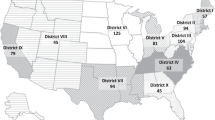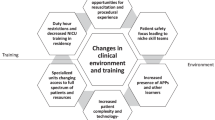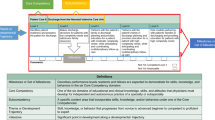Abstract
The Accreditation Council for Graduate Medical Education (ACGME) Pediatric Subspecialty Milestone Project competencies are used for Neonatal-Perinatal Medicine (NPM) fellows. Milestones are longitudinal markers that range from novice to expert (levels 1–5). There is no standard approach to the required biannual evaluation of fellows by fellowship programs, resulting in significant variability among programs regarding procedural experience and exposure to pathology during clinical training. In this paper, we discuss the opportunities that Milestones provide, potential strategies to address challenges, and future directions.
This is a preview of subscription content, access via your institution
Access options
Subscribe to this journal
Receive 12 print issues and online access
$259.00 per year
only $21.58 per issue
Buy this article
- Purchase on Springer Link
- Instant access to full article PDF
Prices may be subject to local taxes which are calculated during checkout

Similar content being viewed by others
References
Warm EJ, Edgar L, Kelleher M, Kinnear B, Sall D, Luciano G, et al. Accreditation council for graduate medical education: a guidebook for implementing and changing assessment in the milestones area. ACGME; 2020. https://www.acgme.org/globalassets/milestones-implementation-2020.pdf.
Hicks PJ, Englander R, Schumacher DJ, Burke A, Benson BJ, Guralnick S, et al. Pediatrics milestone project: next steps toward meaningful outcomes assessment. J Grad Med Educ. 2010;2:577–84.
Swing S. The Pediatrics Subspecialty Milestone Project. The Accreditation Council for Graduate Medical Education and: ACGME; 2015. https://www.acgme.org/Portals/0/PDFs/Milestones/PediatricsSubspecialtyMilestones.pdf.
Hamstra SJ, Yamazaki K, Shah H, Kondur S, Edgar L, Sangha S, et al. ACGME Milestones National Report 2019 Executive Summary. 2019. https://www.acgme.org/Portals/0/PDFs/Milestones/2019MilestonesNationalReportFinal.pdf?ver=2019-09-30-110837-587.%20Accessed%207/16/2020.
Miller A, Archer J. Impact of workplace based assessment on doctors’ education and performance: a systematic review. BMJ. 2010;341:c5064.
Natesan S, Stehman C, Shaw R, Story D, Krzyzaniak SM, Gottlieb M. Curated collections for educators: five key papers about receiving feedback in medical education. Cureus. 2019;11:e5728.
Kogan JR, Hatala R, Hauer KE, Holmboe E. Guidelines: the do’s, don’ts and don’t knows of direct observation of clinical skills in medical education. Perspect Med Educ. 2017;6:286–305.
Nash RA, Winstone NE. Responsibility-sharing in the giving and receiving of assessment feedback. Front Psychol. 2017;8:1519.
Guerrasio J, Brooks E, Rumack CM, Aagaard EM. The evolution of resident remedial teaching at one institution. Academic Med. 2019;94:1891–4.
Kalet A, Chou CL. Remediation in medical education: a mid-course correction. 2014. https://link.springer.com/book/10.1007%2F978-1-4614-9025-8.
Sawyer T, Gray M, Chabra S, Johnston LC, Carbajal MM, Gillam-Krakauer M, et al. Milestone level changes from residency to fellowship: a Multicenter Cohort Study. J Grad Med Educ. 2021;13:377–84.
Klein R, Julian KA, Snyder ED, Koch J, Ufere NN, Volerman A, et al. Gender bias in resident assessment in graduate medical education: review of the literature. J Gen Intern Med. 2019;34:712–9.
Sukhera J, Wodzinski M, Milne A, Teunissen PW, Lingard L, Watling C. Implicit bias and the feedback paradox: exploring how health professionals engage with feedback while questioning its credibility. Acad Med. 2019;94:1204–10.
Wolpaw J, Saddawi-Konefka D, Dwivedi P, Toy S. Faculty underestimate resident desire for constructive feedback and overestimate retaliation. J Educ Perioper Med. 2019;21:E634.
ACGME. ACGME program requirements for graduate medical education in neonatal-perinatal medicine. 2020. https://www.acgme.org/Portals/0/PFAssets/ProgramRequirements/329_NeonatalPerinatalMedicine_2020.pdf?ver=2020-06-29-162707-410.
French HM, Leeman KT, Wambach JA, Malik SK, ONTPD Fellowship Directors Writing Group, Reber KM. Essentials of neonatal-perinatal medicine fellowship: an overview. J Perinatol. 2022;42:269–76 https://doi.org/10.1038/s41372-021-00973-3.
Sargeant J, Mann K, Manos S, Epstein I, Warren A, Shearer C, et al. R2C2 in action: testing an evidence-based model to facilitate feedback and coaching in residency. J Grad Med Educ. 2017;9:165–70.
Li ST. The promise of milestones: are they living up to our expectations? J Grad Med Educ. 2017;9:54–7.
Downing SM. Validity: on meaningful interpretation of assessment data. Med Educ. 2003;37:830–7.
Moon TR. Project implicit - Implicit Association Test (IAT) Harvard University. https://implicit.harvard.edu/implicit/takeatest.html.
Raj JM, Thorn PM. A faculty development program to reduce rater error on milestone-based assessments. J Grad Med Educ. 2014;6:680–5.
Roch SG, Woehr DJ, Mishra V, Kieszczynska U. Rater training revisited: an updated meta-analytic review of frame-of-reference training. J Occup Organ Psychol. 2012;85:370–95.
Baker K, Haydar B, Mankad S. A feedback and evaluation system that provokes minimal retaliation by trainees. Anesthesiology. 2017;126:327–37.
Dweck C. Mindset the new psychology of success. New York: Random House; 2016.
Ten Cate TJ, Kusurkar RA, Williams GC. How self-determination theory can assist our understanding of the teaching and learning processes in medical education. AMEE guide No. 59. Med Teach. 2011;33:961–73.
Moroz A, Horlick M, Mandalaywala N, Stern DT. Faculty feedback that begins with resident self-assessment: motivation is the key to success. Med Educ. 2018;52:314–23.
Cusack J, Fawke J. Neonatal resuscitation: are your trainees performing as you think they are? A retrospective review of a structured resuscitation assessment for neonatal medical trainees over an 8-year period. Arch Dis Child Fetal Neonatal Ed. 2012;97:F246–8.
Kane SK, Lorant DE. Creation and validation of tool to assess resident competence in neonatal resuscitation. Acad Pediatr. 2019;19:394–8.
DeMeo SD, Katakam L, Goldberg RN, Tanaka D. Predicting neonatal intubation competency in trainees. Pediatrics 2015;135:e1229–36.
Volz S, Stevens TP, Dadiz R. A randomized controlled trial: does coaching using video during direct laryngoscopy improve residents’ success in neonatal intubations? J Perinatol. 2018;38:1074–80.
Ghoneim N, Dariya V, Guffey D, Minard CG, Frugé E, Harris LL, et al. Teaching NICU fellows how to relay difficult news using a simulation-based curriculum: does comfort lead to competence? Teach Learn Med. 2019;31:207–21.
Ten Cate O, Hart D, Ankel F, Busari J, Englander R, Glasgow N, et al. Entrustment decision making in clinical training. Acad Med. 2016;91:191–8.
El-Haddad C, Damodaran A, McNeil HP, Hu W. The ABCs of entrustable professional activities: an overview of ‘entrustable professional activities’ in medical education. Intern Med J. 2016;46:1006–10.
Ten Cate O, Regehr G. The power of subjectivity in the assessment of medical trainees. Acad Med. 2019;94:333–7.
Parker T, Guiton G, Jones M. Choosing entrustable professional activities for neonatology: a Delphi study. J Perinatol. 2017;37:1335–40.
O’Dowd E, Lydon S, O’Connor P, Madden C, Byrne D. A systematic review of 7 years of research on entrustable professional activities in graduate medical education, 2011-2018. Med Educ. 2019;53:234–49.
Edgar L, Roberts S, Holmboe E. Milestones 2.0: a step forward. J Grad Med Educ. 2018;10:367–9.
Author information
Authors and Affiliations
Consortia
Contributions
Each contributing author was responsible for writing a section of the manuscript. The manuscript was compiled by first author and group edited by the authors over several Zoom meetings. Senior author wrote a portion of the manuscript and provided oversight for editing. First author finalized edits and references, submitted manuscript, and corresponded with journal editor.
Corresponding author
Ethics declarations
Competing interests
The authors declare no competing interests.
Additional information
Publisher’s note Springer Nature remains neutral with regard to jurisdictional claims in published maps and institutional affiliations.
Rights and permissions
About this article
Cite this article
Carbajal, M.M., Dadiz, R., Sawyer, T. et al. Part 5: Essentials of Neonatal-Perinatal Medicine Fellowship: evaluation of competence and proficiency using Milestones. J Perinatol 42, 809–814 (2022). https://doi.org/10.1038/s41372-021-01306-0
Received:
Revised:
Accepted:
Published:
Issue Date:
DOI: https://doi.org/10.1038/s41372-021-01306-0
This article is cited by
-
Optimizing clinical care and training in the neonatal intensive care unit: the relationship between front line providers and physician trainees
Journal of Perinatology (2023)
-
A new era of assessment for neonatal-perinatal medicine trainees: milestones 2.0
Journal of Perinatology (2023)
-
Optimizing neonatal patient care begins with education: strategies to build comprehensive and effective NPM fellowship programs
Journal of Perinatology (2022)



